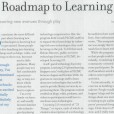When I visited my parents in December of 2019, they asked me to go through a box of old stuff they wanted to get rid of. My mother had kept basically all the art we did, the bajillion songs and poems I wrote, everything we did for school, etc. It was surprising how much she’d kept given that she is the polar opposite of a packrat. Anyway, one of the things I noticed was how many cards and signs and stuff I’d made for my parents as a child; often for no particular occasion. I remember always wanting to surprise them. Making them cards. Trying to make them pathetic breakfasts in bed. Pretending I was a “brownie” and doing household chores (probably badly) before they woke up. Giving them “surprise parties” that were probably pretty pathetic given my age and abilities. And seeing these tangible artifacts made me so sad, because I remember how desperate I was back then to get them to be happy with me. I lived in a house where I never knew when someone was going to explode at me. There was a lot of screaming, a ton of harsh criticism, and I felt like their love was always conditioned on my fitting a mold I was always falling short of. Now, I can see that these issues were theirs, but as a child, I was convinced that I was a terrible kid. So those cards and signs and banners reminded me of how desperate I was back then to feel loved and how nothing I did ever seemed like enough.
It doesn’t take a professional to make the connection between this and my workaholism. That need to please translates pretty seamlessly into the world of work. So instead of chasing love, you start chasing accolades and recognition, because you think when you get them you will finally feel whole. You won’t be that bad kid anymore. But it never happens because the hole you’re trying to fill is your own self-perception and when it’s been drilled into your head from early childhood that you are BAD, no achievement will really change your mind. I’ve done a lot of work on myself over the past few years, working to feel like I’m enough just as I am. And I’ve stepped back from a lot of “extracurricular” things I used to do in the hopes of making myself feel better. It has helped me immensely to let go of a lot of negative views and pressure I put on myself. I can see that I’ve made a ton of progress and I’m really proud of myself. But like any addiction, it is so easy to fall back into destructive patterns, and workaholism is different in that it’s often encouraged and rewarded.
When the writing was on the wall about an at least partially remote Spring 2020, I fell so hard into those old patterns. There are only three of us among the reference and instruction crew who have online instructional design skills and one has OER work as significant part of their job and the other was going on sabbatical for Spring. So I felt the weight of responsibility as the only person who could help get her colleagues up to speed with teaching online. I was needed and I’m sure you can imagine given my history what a potent drug being needed is.
So I offered appointments where I taught colleagues how to use Zoom and talked with them about online instruction. I created a guide with info for teaching online, creating tutorials, embedding in D2L, and finding our existing instructional content. I built interactive tutorials like a madwoman that my colleagues copied for their own use. I shared everything I made and did, emailing tips about how I approach synchronous online teaching or how to make videos using Zoom. I worked myself to the bone. I spent my Spring Break (a time I’m off-contract and wasn’t getting paid) working ten-hour days feverishly getting ready for the quarter. I did it all because I knew my colleagues needed help and I knew I could be useful. And I put all of this work before my son, who was struggling horribly with school and with the isolation of not seeing his friends during this time. He was miserable and I barely had time for him because of my work. And, in the end, my efforts were barely acknowledged, though I understand everyone was super-stressed and worried about their own stuff. Still, it felt really demoralizing. But recently, my friend who had been watching all this unfold from her sabbatical told me that “you really singlehandedly carried us during Spring. It wouldn’t have gone as well as it did without you.” She told me that she had tried to delay her sabbatical because she’d been so worried about me, but was told she couldn’t. After we talked, I burst into tears because it’s the first time I’d heard anything like that from someone in the library. It was the first time I’d really felt seen. I was blown away that someone had actually worried about me.
At the same time last Spring, one of my closest colleagues announced that she was leaving. There are only three of us reference and instruction librarians on each campus, so we’re a pretty tight-knit group. I am a better teacher now because of the hundreds of conversations she and I had about teaching and the many sessions we collaboratively planned. She was an exceptional colleague and friend (well, she still is my friend!). Not only did I have to deal with the sadness of losing her, but our boss, who had initially told us we’d be getting full-time backfill next year, told us that we’d be getting no backfill at all. No support. And when I asked to quit a major College service commitment for the following year that I’d committed to for the library based on the promise of that support, I was told that it was important for me to do that too. After the Spring I’d just had, after all I’d given up, it was a gut punch. No lesson taught me more completely that work will not love you back and that the only reward for hard work is more work. But more than that, Spring broke me in some fundamental way. I haven’t felt the same since.
Chasing external validation is always a losing battle. Even when you get it, it never feels as good as you think it will. It never makes you feel whole. And I don’t even think I was chasing recognition when I did what I did in Spring. I felt a sense of responsibility because I had a critical skill-set and not doing what I did would have been shitty (though perhaps understandable given that I was also homeschooling a child?). I think what really broke me is that I naively believed if I was a good team-player, if I was committed to helping others, I would get help in return when I needed it. But over the past two years, I’ve reached out several times to ask for support and didn’t get any. I have a really hard time asking for help and admitting that I need it. Asking for help brings up intense feelings of shame for me. When I ask for help, I’m usually truly at the end of my rope. So when my pleas for help are met with crickets, it is all the more heartbreaking. And I totally understand that everyone is struggling and everyone has a lot to do. But it made me feel like that little kid again — there has to be something wrong with me that makes people not want to help me. Intellectually, I know that’s not true, but still…
Was my mistake thinking that reciprocity is a thing? Was it extending myself so much in the first place? Should I not have cared so much about helping my colleagues who had little-to-no experience teaching online? Should I have been more selfish? Am I delusional for thinking the things I did in Spring were important? Maybe they weren’t. I just don’t know what I should have done differently last Spring other than putting my son first every time. But I do know I never want to feel that way again and I don’t know if the answer is just to not care (or care less) about work or what. I know that the one who needs to change is me. We know, based on research, that burnout is caused by and can only really be fixed by managers and administrators, but that doesn’t change the reality that people are suffering who either can’t or don’t want to leave their job. When it comes down to it, I love my work, I love my colleagues, and I love our students and so I need to find a different relationship to the job I have for my own well-being.
This Spring Break, I’m not doing any work. I’m not checking my work email even. I’m putting my well-being and my family first. And I’m really thinking about how to do Spring term this year in a way that doesn’t cause me harm. I think I’m going to have to be more selfish. I think I’m going to have to keep my mouth shut when people ask for volunteers for things. I’m going to need to stand in the back rather than be front and center with instructional outreach like I usually am. I’m immensely grateful for my dear colleague in our (now) team of two on our campus. He’s been so sympathetic to what I’ve been dealing with as a working parent who is also homeschooling and he’s promised to support me in stepping back. But in the end, I am going to have to make those hard choices myself to step back from things. I have to break these habits and kill this constant voice in my head that tells me I’m not doing enough. I need to feel less responsible for everyone and everything. I need to drop the ball.
And I’m writing all this for two reasons. The first is because I will be more likely to follow through on something if I say it out loud like this. The second is because I know I’m not the only people pleaser, the only over-achiever, the only person who never misses a deadline, the only person who has tied themselves in knots trying to be a great employee and colleague. For most of us, nothing will change until we do. I think we need to drop the ball sometimes and see that the world doesn’t end to decouple our sense of self from our work achievements. I mean, when my colleagues drop the ball, I don’t think less of them. Why is it ok for them but not for me to blow it? I also think that most managers will never do anything about workload inequity issues until the people who do the most STOP. Workload inequity has been an issue everywhere I’ve worked (in libraries, social work, and beyond) and most managers are all too happy to have people who never say no to keep doing more than their share because it means they don’t have to deal with the issue. And with vocational awe in our field, just like when I was a social worker, there seems to be a never-ending supply of idealistic people pleasers ready to work themselves into burnout with the “help” of their negligent managers. Let’s stop the cycle friends. Let’s drop the ball.
Image credit: Drop it! by Paul Long CC-BY







You are so right! I join you in letting go & setting boundaries.
About a year after I started a big job, I went home on Friday thinking I was going to a conference. Instead I ended up in hospital with pneumonia and didn’t return for over six weeks. And everything was fine. That taught me a lot.
I am a classic underachiever – which is to say that as a child I sought out attention by NOT meeting expectations, because the punishments felt better than neglect. Not a healthy standard either, and it wouldn’t be good for my professional life to start manifesting those behaviors at work. Still, in some ways it may help, because now when I overcome my desire to procrastinate, to forget, to blow off work, I feel pretty good about myself, and yet I don’t expect myself to be pushing past a fairly reasonable level of work-activity, and I don’t over-commit. I still have that sense of imposter-syndrome, for what it’s worth, but more because I worry that in fact someone will realize that I don’t work as hard as they do. I guess what I mean is that no one is perfect, and finding a more comfortable level of imperfect is sometimes the best you can achieve.
Thank you for writing this. I never would have connected workaholism to trying to earn love from abusive parents as a young child, but it makes sense. I’m glad you are prioritizing your well being and your son’s this spring break. I hope it will replenish your energy and give you space to reflect more too about how you want to change habits for sustainability at work. Here’s to balls to be dropped!